The Technische Universität Dresden presents a number of approaches that employ concepts closely connected to STEAM and are transferred into/developed for teaching.
As a university with a strong technological branch, TU Dresden focusses on research dealing with real-world challenges that may be solved with technological applications communicated through (human-centred) methods like prototyping techniques, demonstrators or simulations to make solutions more accessible to other disciplines, companies or society in general. Respectively, the research cluster of excellence CeTI (Center for Tactile Internet with Human-in-the-Loop) uses 5G technology to develop a tactile internet enabling virtually everyone to access expertise in a physical way and thus democratizing knowledge and skills via the internet.
Furthermore, conceptionalized as a full university TU Dresden provides many possibilities to collaborate across disciplines on site. In addition to that the city of Dresden is a scientific and cultural hub giving access to a great number of excellent research institutes, (start-up) companies or cultural institutions like museums. Thus, inter- and transdisciplinarity are crucial to research and teaching at TU Dresden. These ideas are incorporated for example in the FLiK modules where interdisciplinary topics are taught in actual interdisciplinary settings. The blurry border between arts and science is visible in projects like BenDit where scientists envision geometric shapes to test the limits of materials and produce exhibited objects well worth seeing.
Moreover, TU Dresden and its partners employ in responsible innovation and use creative techniques like design thinking partnering up with the cities’ creative industry. Design driven approaches help to incorporate different perspectives from various stakeholder groups and focus on solutions where society in general and users in particular can profit. Courses like the interdisciplinary summer course for students transfer these concepts into teaching where students can use collaboration methods and work with companies in interdisciplinary groups to solve real world problems.
Video
Project Credits / Acknowledgements
This project is included within the framework of STEAM INC that has been funded with the support of the European Union and the Erasmus+ Programme.



